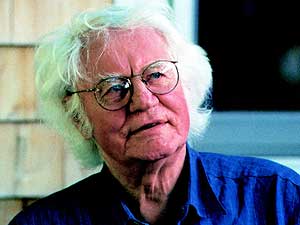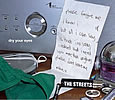Friday, May 25, 2007
Why so much emphasis lately on choosing whether or not to keep babies? Why is this even a legitimate question? I can't help but see the introduction and legalization of birth control as the crux of this matter. Separating sex from procreation and introducing choice is an unstoppable process.
Monday, May 21, 2007
On Altered Desitiny and Friendship as Fundamental
 Besides being fabulously over-the-top (suddenly, self-exiled prince runs into a woman dancing on a mountain top/cut to her in a waterfall/cut to her coming to him for milk when he was learning to milk a cow), Asoka carries a tremendous and powerful message with political implications.
Besides being fabulously over-the-top (suddenly, self-exiled prince runs into a woman dancing on a mountain top/cut to her in a waterfall/cut to her coming to him for milk when he was learning to milk a cow), Asoka carries a tremendous and powerful message with political implications.Asoka is a prince who should not ascend to the throne based on birth order, but destiny has chosen him to rule. The film is full of themes that show that birth is not relevant, but the life you make for yourself is. When Asoka believes the woman he has fallen desperately in love with has been killed, he becomes a killer himself--a strong warrior with an evil soul. He has only one friend who attempts to stop him from his lawless rampage but cannot.
Asoka meets his first love on the battlefield at the end of the film. Suddenly, in her eyes, he sees what he has become. The film is truly a tragedy, for it is precisely the clever, Jacob-like qualities in Asoka that protected him early in the film that get out of control and overtake him. And without love, he has no one else's eyes through which to see himself. He cannot see his pride, then. It is only at the end of the film that he feels remorse, because he sees in the eyes of his love the evil man he has become.
This film, then, is about friendship. Friendship is the thing that draws us outside of ourselves in order to evaluate ourselves and our actions toward others. Even more than friendship, the film is about erotic love--a species of friendship. It is this love that speaks to him more than the love of his second wife, which is less erotic, more than the existence of his children, more than his one friend and protector. It is erotic love that actually has the force needed to change Asoka. In the end, this love drives him to repent and renounce his ways and become a Buddhist. It is only in the self-giving, then, that accompanies love, that the redemptive possibility is open.
Friday, May 18, 2007
On Confession
The idea of doing penance and healing the separation between us and God and us and ourselves and us and the Church is beautiful. There is a searching for unity and wholeness and harmony that is important and perhaps only possible in the Church and not in the state. It seems consistent with a Voegelinian understanding of always turning toward or away from the Divine Ground of being. The Catholic understanding is that we can't separate the divine from the others we are turning with. We have to turn ourselves and also as part of the body of Christ.
Bly's so fly

Monday, May 14, 2007
What led to this change? A lack of respect for life? A modern aversion to death (as opposed to a previous respect for and understanding of death that we have lost and must replace with a shunning of death)?
What is it that makes a good obituary (which, at its finest is a concise biography that captures and conveys the essence of the person)? It seems that T. S. Eliot's idea of the "objective correlative"--an object that stands for and gets at a corresponding emotion---is useful here. An excellent obituary contains images from that person's life that sum up that person's life. Or, better yet, the obituary includes specific seminal moments of that person's life that frame and give us categories for thinking about his life. This story should provide insight and order to that person's life.
If I died now, I think that good objective correlatives for my obituary would be my typewriter, my room, my tea-light holder, and my picture of a woman reading.
Sunday, May 13, 2007
Dry Your Eyes, Mate

I'm not gonna fuckin', just fuckin' leave it all now
I wonder if what resonates about this song is that the narrator has a proper conception of marriage--as something that is inviolable and lasting until death. The tragedy of the song is that the society does not support the narrator's true understanding of marriage. Rather, the society tells him to give up, to move on, to walk away, using an appropriate animal metaphor. For if marriage is not a substantial thing with its existence outside of a contract, then we are, in fact, like animals. This song shows the death of love and marriage. It purports to offer a sort of hope in exchange ("There's plenty more fish in the sea"), but this is not hope--it is hope of physical satisfaction, but not of emotional completion. There is something in the song's melody that is properly mournful, supporting the narrator's loss of his love and the society's loss of stability.
Saturday, May 12, 2007
Modern Eugenics

No, what we really need is an ethical system that provides reasons why giving birth to a down syndrome baby is good and why aborting one is evil and why it isn't a choice to bear the child, it is a responsibility. We need to understand that imperfection is human and must remember Nathanial Hawthorne's warning in his short story, "The Birthmark" that if we try to eliminate all imperfections and strive for utopia, we will disconnect from our own humanity.
What beauty a person with down syndrome offers: he reminds us of our own dependence on each other and on God. He reminds us of our own limits and imperfections. And with his sinlessness, he reminds us of the innocence with which we must approach God. How dare we reject what has been given to us to love?
Friday, May 11, 2007
Serial Monogamy

On Apology

Thursday, May 10, 2007
The life is in the thing that flows.
The moment in the car, saying good-night.
The moment on the bench, turning away.
These are intimations of an un-awk
Ward moment promised. When we push, flying
Like water, delight, vivacious, spilling
Singing, willing, together toward our end.
Tuesday, May 8, 2007
The Contemporary Colosseum
In The Golden Bough, Sir James Frazer writes about the blurring of the line between the sacred and the profane in ancient civilizations: "To us these various classes of persons appear to differ totally in character and condition; some of them we should call holy, others we might pronounce unclean and polluted. But the savage makes no such distinction between them; the conceptions of holiness and pollution are not yet differentiated in his mind." There are also primitive (and modern) traditions of killing the god and eating him. I wonder if the Paris Hilton phenomenon isn't yet another case of confusion regarding exalted status that can quickly switch to scapegoat when the people's mood swings. It isn't that I'm advocating ignoring the transcendent in the future, let's just work a little harder to properly locate it.
Sunday, May 6, 2007
The Politics of the Present
"All these times and places and occasions are now and here. God himself culminates in the present moment, and will never be more divine in the lapse of all the ages. And we are enabled to apprehend at all what is sublime and noble only by the perpetual instilling and drenching of the reality that surrounds us. ... Be it life or death, we crave only reality. If we are really dying, let us hear the rattle in our throats and feel cold in the extremities; if we are alive, let us go about our business. Time is but the stream I go a-fishing in. I drink at it; but while I drink I see the sandy bottom and detect how shallow it is. Its thin current slides away, but eternity remains."

Thoreau obviously gets the transcendence that inheres in the person. Also, his craving for reality speaks to a search for truth, including the truth of existence that is admirable, and seems to be acknowledging the connection between the "is" and the ought." The theology, however, is a little iffy (although I do think heaven will be something of an eternal present, but one that includes within it action and movement--it will be an actualized telos).
